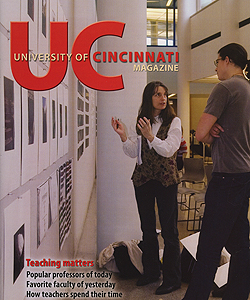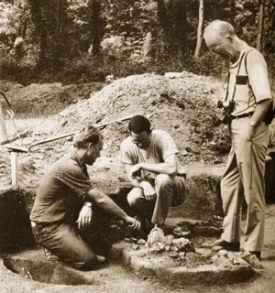Gustav Carlson was a gentleman scholar
"What would Carlson have done in this situation?"
When he faces trying moments in class, Kevin Grace, MA (A&S) '77, UC's head archivist and an assistant professor, often wonders how Gustav Carlson, his "remarkably kind" professor, would have handled it.
Carlson, who died in 2006 at the age of 96, taught sociology and anthropology at UC from 1936-80. The gentlemanly professor with the Swedish accent served as head of UC's department of sociology and anthropology from '61 until the department of anthropology split off in 1969, which he then headed until '77.
"You always had to maintain, according to Carlson, a dignified presence in the classroom," says Grace, who started at UC in '75 as an anthropology master's student and served as Carlson's teaching assistant. "He made you feel that if you were going to go out and teach, first of all you treated your students like mature adults. And you made sure that you were available for them at any time."
Gustav, who became known for his lecturing abilities, won the A.B. (Dolly) Cohen Award for Excellence in Teaching in '62, the second year UC gave the award.
"I thought he was a wonderful teacher and a scholar," says Grace. "He just had a presence in the classroom. He had a remarkable knack for getting you to look at the world around you and try to figure it out."
Gus' colleagues also remember his skill in the classroom, says associate professor of anthropology Joe Foster, who succeeded Carlson as department head. "Gus was sort of quiet," says Foster. "But if you attacked his department, you raised the tiger. Actually, you raised the Swedish wolverine."
Carlson was born to Swedish immigrants and spoke Swedish as his first language. He was one of the first graduate students of Leslie White, an anthropologist at the University of Michigan in the '30s, who became known for his ideas about cultural evolution.
Carlson theorized in his "Evolution of Culture" class that had Adolf Hitler never been born, the Holocaust would still likely have occurred as the culture at the time presented the opportunity for a brutal dictator to rise to power. And for "Introduction to Anthropology," he sent the class of freshmen to the zoo to stand in front of the chimpanzees and gorillas for an hour to observe their behavior, then write a paper about it. The intent was to get them thinking about their own social behavior.
Carlson's 44-year career at UC was interrupted during World War II when he served as chief of the intelligence section at the Office of War Information in Kunming, China. In need of a translator, Gus hired a Vietnamese man named Ho Chi Minh, the same who later became the leader of communist North Vietnam.
The anthropology prof's other brush with the infamous came a few years earlier when Thomas Dewey, New York's mob-busting prosecutor, used his dissertation on the cultural complex of numbers gambling to help bring down gangs.
"Carlson was a very colorful character," says Grace. "But the thing is, when you met him, he never talked about any of that stuff. He was very circumspect about revealing himself in any way. He always had that gentlemanly persona."

 Issue Archive
Issue Archive